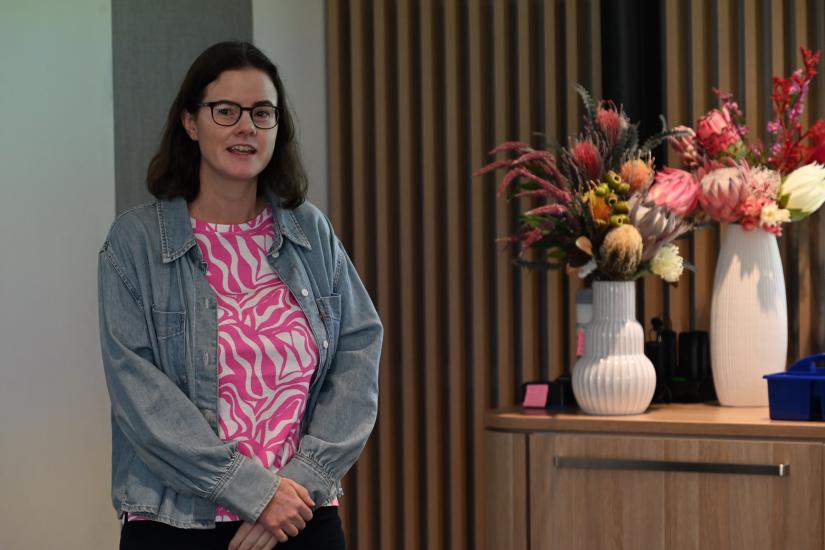A novel consumer-led project, NurtureNextGen, is set to transform the support available to families of children with genetic neurodevelopmental conditions.
NurtureNextGen: Empowering families

Erin Turbitt speaking at Research Cafe
Led by Erin Turbitt, senior lecturer and social scientist with Genetic Counselling at UTS, this initiative aims to provide balanced and positive information to parents during the crucial time of diagnosis.
The project was inspired by interviews with 32 parents across Australia, who highlighted the need for more optimistic and comprehensive discussions with healthcare professionals. In response, UTS researchers partnered with parents who have children with neurodevelopmental conditions. Together, they secured funding from the Medical Research Future Fund through a consumer-led research grant.
Consumer research assistant with Genetic Counselling at UTS Elizabeth Callinan said, “The thoughtful approach to the inclusion of consumers across the life of the grant is so refreshing. I feel proud to be part of the Chief Investigator team and able to assure other consumers who might be interested in contributing to our project in various ways that their contributions will be respected and appropriately remunerated.”
“The expertise I bring from my lived experience as well as my non-research professional knowledge and expertise is acknowledged and valued. It feels good being able to bring my whole self to this important project,” she said.
The thoughtful approach to the inclusion of consumers across the life of the grant is so refreshing.
NurtureNextGen, which commenced in January 2025, is a three-year endeavour focused on co-designing a support tool for parents. The funding has enabled Elizabeth to join UTS as a chief investigator, while another parent serves as an associate investigator. Their involvement ensures that the project remains deeply rooted in the experiences and needs of parents.
A consumer advisory group has been established to guide the project's direction, with parents actively participating in data analysis and dissemination. The team plans to conduct co-design workshops and interviews with up to 50 parents. The project is supported by seven partner organisations, including advocacy and support groups, and involves a diverse team of investigators from six institutes across Australia and the US.
This project is so exciting as we have funding to dedicate three years to co-designing a resource that is with parents, for parents.
The collaborative approach of NurtureNextGen was evident in the preparation phase, where researchers and parent partners reviewed literature and published their findings together. This method ensures that parents' voices are central to the research process.
Erin said, “This project is so exciting as we have funding to dedicate three years to co-designing a resource that is with parents, for parents. These types of projects are often not successful in securing grants, because there’s an expectation that the intervention will have already been developed in preliminary or pilot research.”
Although still in its early stages, NurtureNextGen has already made a significant impact. The project's success in securing grant funding underscores the importance of consumer collaboration in research. Over the next three years, the team will work to develop a tool that truly reflects the needs and insights of parents.
Consumer partnerships are at the heart of NurtureNextGen, aiming to foster more positive and balanced conversations at the time of diagnosis for families of children with genetic neurodevelopmental conditions.